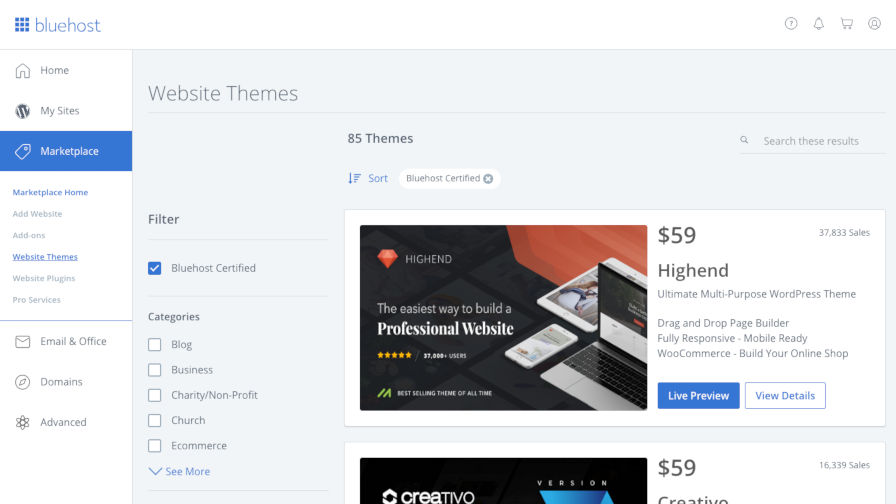
In November, web hosting provider Bluehost launched a WordPress plugin and theme marketplace. The company integrated with MOJO Marketplace to provide access to WordPress products via its customer dashboard. Currently, the marketplace is open to third-party theme developers. Plugin authors will have to wait, but they will eventually be able to sell their plugins through the Bluehost Marketplace.
By integrating with MOJO Marketplace, much of the existing infrastructure and products are already in place. Bluehost can simply offer the products to its customers through a custom-built interface and provide MOJO sellers with another avenue for distribution.
The idea behind the marketplace is for Bluehost’s customers to be able to build their websites without ever leaving their control panel. “Ultimately, we are trying to save customers time and energy from having to hunt for these things themselves and instead work within the dashboard to find the themes and plugins that are best fit for their site,” said Suhaib Zaheer, general manager for Bluehost.
“Our native marketplace also provides our customers with the ability to automatically install the themes and plugins they have purchased, reducing the amount of time and number of steps required to get their site appearance and functionality up and running,” he said.
The Bluehost Marketplace currently has over 900 themes and 18 WooCommerce plugins for customers to choose from. The themes are all viewable via the WordPress themes page on the MOJO website. All themes uploaded by sellers go through a manual review process by the Bluehost Marketplace team before approval. This includes basic items like design quality, functionality, installation, and documentation.
There is also a “Bluehost Certified” filter available to users who want to use themes that have been further tested for quality control. “We conduct additional reviews to certify themes for our Bluehost Certified category on a quarterly basis,” said Zaheer .
There appear to be 85 themes that are Bluehost Certified based on a screenshot acquired of the marketplace. However, that number is not verified. The MOJO Marketplace page does not appear to have a filter to view these, but it is available to users of Bluehost’s hosting service.
Selling on the Bluehost Marketplace
Theme developers who want to sell themes via Bluehost can apply through MOJO Marketplace. Authors should note that they would like to be Bluehost Certified.
Theme sellers who want to get certification must meet the Bluehost Certified guidelines. Some are fairly normal and would be expected in today’s market such as responsiveness, browser compatibility, fast load times, and active support from the author.
Others are a bit of a head-scratcher.
Certification requires that themes support page builders. It’s unclear which page builders need to be supported and what level of support is necessary. Ideally, this would be the other way around. Page builders should be built in such a way that they do not need theme-specific support.
Demo content is required. It is not clear if the requirements simply mean to provide an installable XML file with demo content or for the theme to output demo content in the absence of user content. Based on the description, it seems like the latter. If so, I would not want any part of that as a potential theme author. I could see requiring the use of the WordPress starter content feature in this case but nothing more.
The requirements also list “plugins supported” with no additional description. Good luck to theme authors figuring out exactly what that means.
Bluehost needs to make its Bluehost Certified page more detailed to be attractive to potential theme authors. There are far too many unanswered questions.
Commission rates are the same rates as other themes on the MOJO Marketplace. Themes sold exclusively through the marketplace earn between 50% and 70% based on the number of sales. Non-exclusive theme commissions are at a flat rate of 50%. Both exclusive and non-exclusive authors can distribute their themes through the Bluehost Marketplace.
“Theme sellers are welcome to set the price of their item,” said Zaheer. “However, we recommend they stay within $49-$69 range. If the review team does not feel the price is uniform with other themes in the same category, they will request a price change in order to be sold on the Marketplace.”
The pricing recommendation seems to be a bit on the low end, but it is consistent with the theme industry’s race to the bottom. Quality theme work should be at least double.
Fortunately for theme authors, pricing is based on yearly renewals. They are required to offer technical assistance within 24-48 hours while a user’s yearly support license is up to date.




